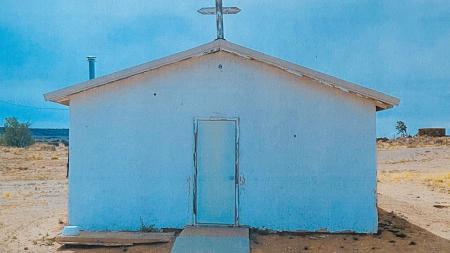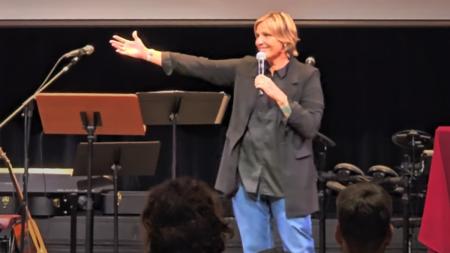Rachael Denhollander: Justice Lives in the Heart of God

Rachael Denhollander remains hopeful, yet doubtful, that convicted sports doctor Larry Nassar, who abused her several times when he treated her in 2000, will ever ask God for forgiveness for what he did to her and many other young women.
Now serving a life sentence of 40-175 years behind bars, Nassar has been accused of abusing at least 250 young girls during his years as a sports doctor for gymnasts at Michigan State University and elsewhere.
“I don’t see any potential for Larry Nassar to be rehabilitated,” said Denhollander at the January Series 2019 on Tuesday, Jan. 22. In 2016 she was the first woman to speak out publicly against Nassar. “He is so hardened. Without an outside miracle, he won’t change, although God gives him every opportunity to change.”
In a talk titled “A Time to Speak: Addressing Justice and Forgiveness,” Denhollander, a mother of four children who is also an attorney, recalled Nassar coming into the courtroom at his trial carrying a Bible and how he frequently said he was sorry for what he did. But having a Bible and speaking a few words of apology is a far cry from facing your own sinfulness, your own brokenness, the evil you brought into the lives of others, she said.
“He has to come face to face with what he has done. Only then can he ask for forgiveness,” added Denhollander.
For her work as an advocate and educator on sexual assault, Denhollander was named one of TIME Magazine’s 100 Most Influential People in 2018. She is the recipient of numerous awards and recommendations, including the Integrity and Impact Award founded by Dow Jones Sports Intelligence, the Arthur Ashe Courage Award, and Heart Ambassador’s Lifetime Achievement Award for Contributing to Social Justice.
Although she mentioned her own experiences in her talk, Denhollander focused mainly on the differences and similarities between biblical justice and forgiveness. She drew a distinction between the two and emphasized the role of justice. “We often think that God’s wrath comes because he doesn’t love,” but that misses the point, she said.
Only in God, she said, do we find the absolute standards that can guide us through the trauma of something like sexual abuse. Only in God can a survivor find the hope that comes with justice.
By its nature, sexual abuse is hidden; the survivor is often riddled by guilt, and the perpetrator wants to keep it that way.
In addition, the people closest to the situation frequently seek any number of reasons to deny the abuse and minimize it if it comes to the surface.
So it can be hard for survivors to find solid ground on which to speak their truth. Being able to put your trust in someone else can be next to impossible.
But knowing the standards by which God governs the world, the ways with which God wants to punish sin and to stand alongside those who have been injured, can be very helpful -- and it has been helpful to her, said Denhollander.
“Justice and forgiveness are fundamental characteristics of Christianity,” she said. “There are very practical and powerful reasons to understand what these are.”
Justice, she said, is about how we as individuals and as a community respond to someone who is an abuser. Justice is when people get what they deserve. Justice is something that brings hope to those who have been abused. “This has to do with what is right and what is wrong, what is good and what is bad,” said Denhollander.
And these are things that are not matters of human opinion, she added; these are matters of morality that come to us from God. As dark as the world can be, as much as there is evil in it, there is light and goodness and holiness “flowing from God who defines the straight line. There is truth,” she said, “that can be spoken without minimizing or downplaying it.”
Knowing that God defines what is good and punishes what is evil offers a survivor a way forward out of the pain that person has suffered. “We can name the evil and grieve the damage even if others don’t,” she said.
Justice is served when the abuser is brought into the light and punished for the abuse, she said.
But also there is forgiveness, which can be our personal response to evil; that is something that is possible because of justice. “We are called to pursue justice, but we also are called to pursue forgiveness. Forgiveness [involves] giving up our claim to retaliation, giving up our bitterness, ” said Denhollander.
As Christians, we have help in pursuing justice and forgiveness because “Christ gave himself over and took on evil. . . . He purchased a people for God. Christ alone is the Lion who conquered evil, but he is also the Lamb” who brings peace and forgiveness.
And because of that, those who place their faith in Christ know we are forgiven of our sins, and yet at the same time justice is served, she said.
“It was fascinating when I gave my statement [at Nassar’s trial]; news outlets discussed how God allowed me to forgive him, but they didn’t focus on the fact that I was also there asking for the judge to give him the maximum sentence,” she said.
“Today I help victims pursue justice because it matters. Justice is found in the heart of God.”


